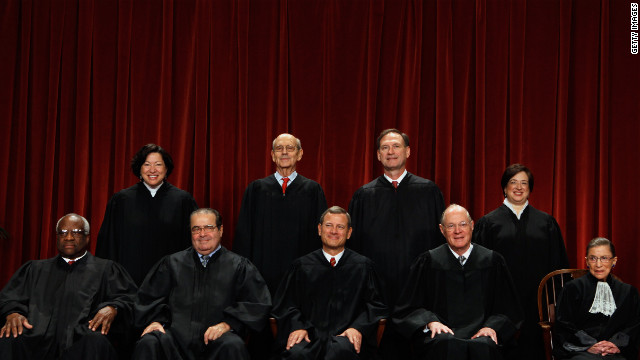TALLAHASSEE — In a ruling that could alter the landscape of politics in Central Florida and across the state, the Florida Supreme Court on Wednesday sided with voter-rights groups challenging the Legislature’s attempts to redraw 27 congressional districts.
Justices adopted the districts sought by the League of Women Voters and other groups who sued lawmakers, in a decision that could have a profound effect on elections in 2016 and beyond.
The reconfigured map gives Democrats an opportunity to pick up two seats, moves Jacksonville Democrat Rep. Corrine Brown’s district out of Central Florida and pushes Winter Garden Republican Rep. Daniel Webster into a Democratic-leaning seat.Republicans currently hold a 17-10 advantage in Florida’s congressional delegation, despite being outnumbered by registered Democrats in the state.
But Brown has vowed to challenge the new maps in federal court because her new district, which runs from Tallahassee to Jacksonville, reduces the black voting-age population from 50 percent to 45 percent. She contends that is a violation of the Voting Rights Act.
“Beyond a doubt, today’s ruling and the proposed congressional map is a direct attack on minority voters and a clear example of voter retrogression and disenfranchisement,” Brown stated.
Webster’s District 10 seat is moved out of Lake County and wholly into western Orange County, becoming a Democratic-leaning district. That means Webster, who ran unsuccessfully to become U.S. House Speaker this fall, will likely need to run in a different district to stay in office.
The 5-2 decision written by Justice Barbara Pariente chided the Legislature for failing to agree to redraw new districts after the court threw out their previous map in July. In that ruling the court found GOP lawmakers had colluded with Republican operatives to draw districts to favor their party, in violation of Florida’s anti-gerrymandering laws.
But the House and Senate failed to reach an agreement on the maps during an August special session. Lawyers for each chamber ended up arguing against each other in court, an unusual sight for chambers controlled by Republicans. So far, the Legislature’s redistricting efforts have cost taxpayers $11 million, mostly in attorneys fees.
“At this stage, after a finding that the 2012 congressional redistricting plan had been drawn with improper intent, the Legislature bears the burden of justifying its redrawn configurations,” the ruling states.
Justice Ricky Polston dissented, criticizing the majority for failing to review the partisan intent of the maps drawn by the League of Women Voters and Common Cause, the groups challenging the Legislature’s maps.
“This is a Court-adopted map, not a legislative-drawn map. The map … the majority adopts was drawn by a Democratic consulting firm, a firm that has performed mapping and data analysis for numerous Democratic candidates and causes,” Polston wrote.
The League of Women Voters, however, was jubilant at the decision.
“The democratic process prevailed today in a landmark victory for Florida citizens,” said Pamela Goodman, president of the League of Women Voters of Florida.
But state Rep. Jose Oliva, R-Miami, who chaired the House’s redistricting efforts, slammed the decision and Pariente in particular, saying the court overstepped its bounds.
“There’s a personal aspect to Justice Pariente’s commentary and her writing that I think speaks of the same lack of judicial restraint that they seem to have shown,” Oliva said.
Voters approved Fair Districts amendments to the state constitution in 2010, prohibiting lawmakers from drawing districts to hurt or harm incumbents, political parties or minority groups. Those amendments and the court’s July ruling placing the burden of proof on the Legislature make redistricting a fool’s errand, Oliva said.
That has led Oliva to consider altering the Fair Districts amendments. But for the League of Women Voters, the ruling is simply abiding by the constitution.
“In accepting the Congressional map submitted by the plaintiffs … the mandates for FAIR Districts — enshrined in our Constitution by 3.1 million voters — are upheld,” Goodman stated.
Despite the decision, Florida’s redistricting saga isn’t over. In addition to Brown’s federal lawsuit, a separate case over redrawing 40 state Senate districts is pending before a lower court.
Source: http://www.orlandosentinel.com/news/politics/political-pulse/os-supreme-court-approves-new-districts-post.html
